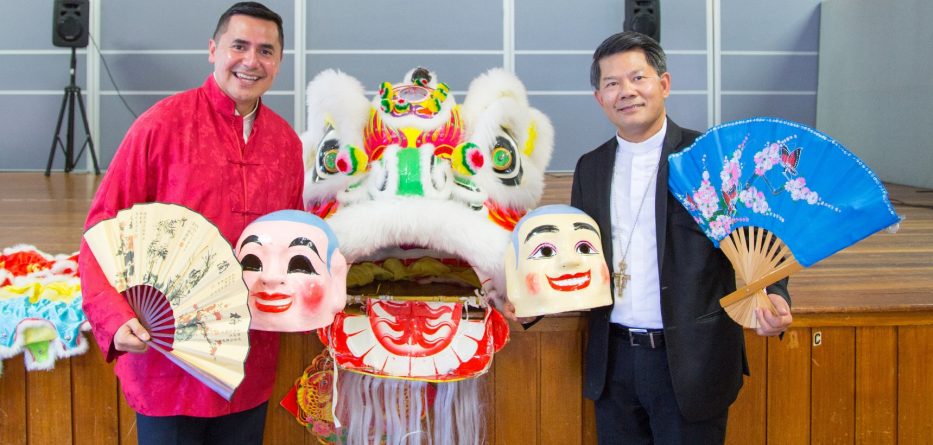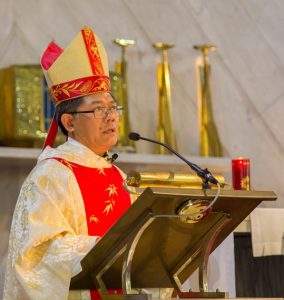Homily of Most Rev Vincent Long OFM Conv
Mass of the 4th Sunday in Ordinary Time, Year A, on the occasion of Lunar New Year at St Monica’s Parish, North Parramatta
29 January 2017
To view a gallery of photos from the Mass and New Year festivities, click here.
Dear friends in Christ,
In Chinese culture, as in Vietnamese too, the Lunar New Year or Spring Festival is probably the most culturally important festival of the calendar year. We farewell the old by thorough cleaning and driving the bad luck away from the house to get ready for a new start. We hang the red letter ‘Fu’ or other auspicious characters on our doors to symbolise the arrival of good fortune and happiness. We visit relatives and friends; we exchange best wishes, gifts and, of course, ‘li xi’ lucky money. Living in a predominantly Western culture like Australia, these traditions that give identity and meaning to us need to be valued and safeguarded.
One of the deeply meaningful aspects of this culturally rich festival is the attention to sacred relationships. We hold family bonds as sacred and honour them accordingly. Children pay respects or ‘kowtow’ to their parents, grandparents and elders in the extended family. Incense is burnt and offerings are made in memory of the deceased ancestors. Therefore, the Spring Festival is a time for family reunion and for celebrating and affirming the network of sacred relationships.
These traditions should not be seen as foreign to the Gospel. In fact, they already contain elements of the Christian heritage. It can be said that the Lunar Festival is a summation of ancient wisdom. It is a celebration of what it means to be a human being, a human being in relationship with others, and for us Christians also a human being in relationship with God who brings all things together in unity. We affirm these sacred relationships to be fundamental to our existence. Whether we are rich or poor, high or low, there is no true happiness for us without our commitment to attending to and nurturing them. The good fortune wishes and gifts are shallow if our lives and relationships are not aligned with God’s purpose for us and the common good of others.
The Word of God today reinforces the ancient wisdom embedded in our culture. It also calls us to orientate our lives to the higher values and principles that will lead us to true blessedness, not simply good fortune in this world but a fulfilment of our God-given purpose of existence.
In the first reading, the book of Genesis gives us an account of God’s creation. In simple and symbolic language, it tells us that we are created not to be alone but to be in relationship with each other. Human beings, male and female, are meant to support and complement each other. This mutual dependence is also extended to all creation because all of life is bound together like a tapestry. Pope Francis in his recent encyclical Laudato Si’ highlights the importance of our relationship with each other and with the natural world. We must see everything as interconnected and indeed as a universal family. Only in this way and not in short-term economic gain or in a purely profit-driven business model, can we hope to restore the fundamental balance, harmony and sustainability in our world.
The Gospel teaching, on the other hand, takes us to another level. In what is known as the beatitudes, Jesus challenges us with the highest kind of moral ideals. He calls us to embody values that seem to be at odds with the popular culture. In fact, they seem to rub against the grain of human nature and as such they are seen more like curses than blessings. Seriously, how can one survive in this dog-eat-dog world by being meek, humble and merciful? How can it be a blessing to be poor, to be sorrowful and especially to be persecuted? They sound more like curses all right. After all, who would wish these things on anybody at any time of the year, let alone at the Lunar Festival?
However, when we examine the words of our Lord carefully, the initial repulsion or puzzlement will give way to a deeper understanding and appreciation. We realise that happiness does not reside in possessions, successes or achievements. Real happiness resides in a heart open to loving, to giving, to caring, to enhancing the lives of others even to the point of dying for the ones we love. Jesus invites us to find this kind of happiness through a life of witness, service and solidarity. Christian happiness belongs to those who dare to give, to serve, to love even to the extent of having to pay the cost of that love in the way that Jesus himself did on the cross. That is fundamentally the meaning of the beatitudes.
Dear friends,
We are filled with gratitude to God for bringing us to this new year. Although there is political uncertainty and division on the global stage, we are ultimately guided the teachings and examples of Jesus. His beatitudes provide us with the co-ordinates for a complete and wholesome life. Like the rooster that brings in the promise of a new dawn, may we also be people who bring light and hope to others. May God enable us to reach blessedness through our daily living of and witnessing to the Gospel values. “Kung hei fat choi” to you all!
Most Rev Vincent Long OFM Conv is the Bishop of Parramatta in Australia. To view a gallery of photos from the Mass and New Year festivities, click here.









